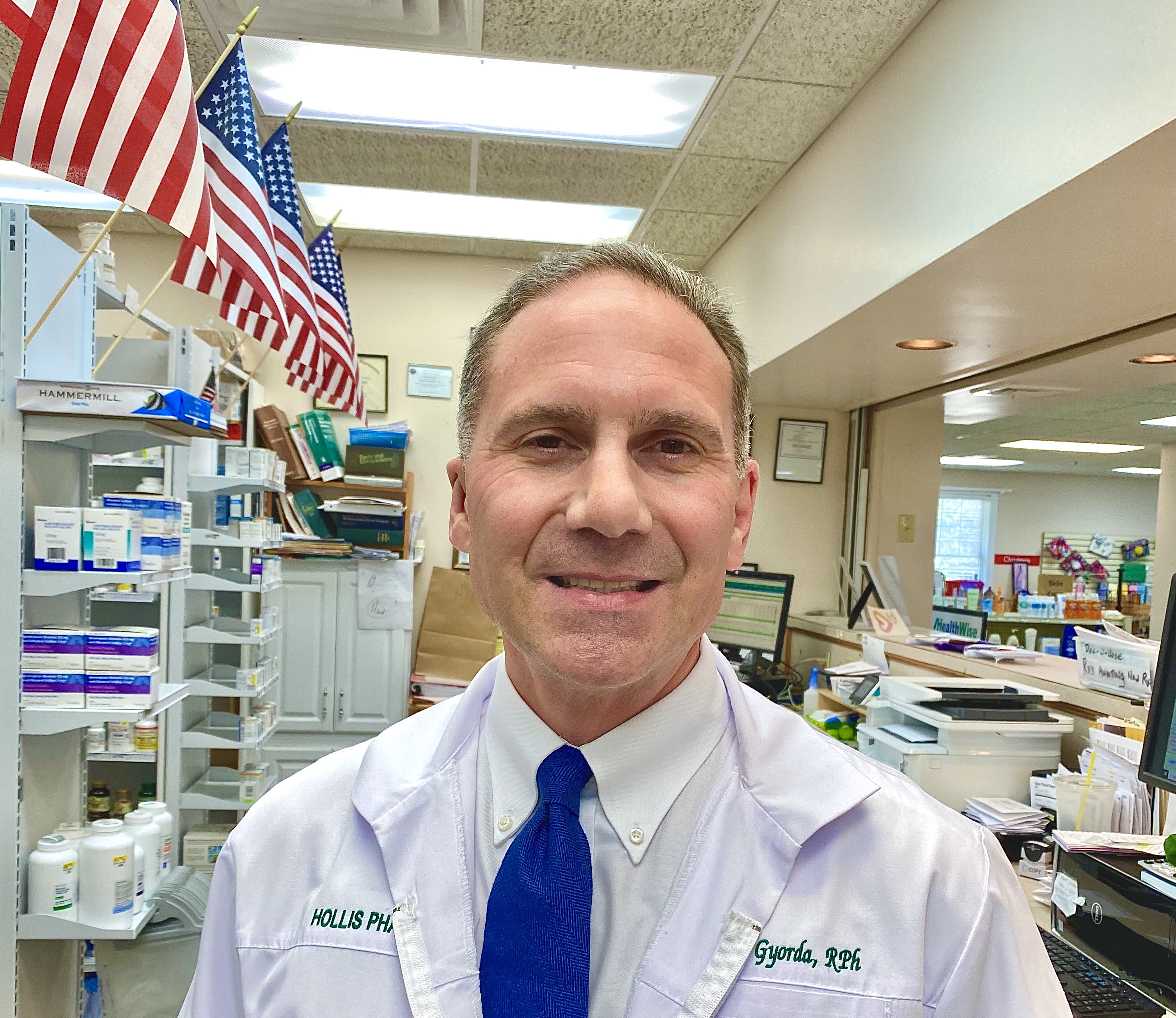Andrew Gyorda is a pharmacist and manager of the Hollis Pharmacy in Hollis, New Hampshire. He has operated the pharmacy for the past four years. Hollis Pharmacy not a chain pharmacy, but a community pharmacy for the Hollis community. You don’t see a different face every time you go to the drugstore like it might be with a chain pharmacy. Andrew is the pharmacist you will see when you come into Hollis Pharmacy. He also looks for unique ways to reach out to the community, including being a drop-location for the local food bank and a card drop-off location to send cards to first responders. The goal is to specialize for the people in the community.
Andrew was always very interested in the human body as a youth. His mom was a registered dietitian for 50 and she encouraged him to pursue a career in one of the health sciences. He was always impressed by how plants and chemical compounds can alter body functions and sought to know more. When he became a pharmacist in the 1980s and early 1990s, it was a five-year program.
He went through the five-year pharmacy program at the University of Rhode Island College of Pharmacy and was in the Pharmacy National Honor Society when he graduated in 1991. He cycled in college and was on the University of Rhode Island cycling team. He has been working as a community pharmacist ever since. He began working for Brooks Pharmacy and remained with them for 25 years before he began managing Hollis Pharmacy.
What made you choose to go into (industry)?
I chose to become a pharmacist because of my interest in the health sciences, and pharmacy interested me the most. I haven’t regretted my decision at all.
I did consider becoming a doctor. My best friend in college is a cardiologist now. I even attended a few of his classes when he was in medical school in New Jersey because I was interested, but I liked what I was doing in pharmacy and I stuck with it.
At the time, medicine was becoming more focused on very brief relationships and doctors were under a lot of time pressures to see a lot of patients each day for just 10 or 15 minutes. Also, recordkeeping and paperwork was becoming onerous at that time.
What do you find most challenging about your career?
Keeping up with the pace of new drugs discoveries is challenging. There is a lot of research being done and there are a lot of products and medicines being brought forth. Keeping up with the mechanisms of action, what diseases they are intended to treat, and at what doses, that is very challenging.
What is one piece of advice you would give someone starting in your industry?
I would say to develop a good work/life balance.
If you could change anything about your industry what would it be and why?
Ideally, you would have patients receiving care and providers, such as doctors, nurses, pharmacists, physical therapists, dentists, speech therapists, giving the care. Then maybe in the middle you would have an administrator to help with the collecting of premiums and payment of the claims. Insurance companies can administer.
Nowadays, we have this industry called PBMs, or pharmacy benefit managers, and they are actually profiteers. I would eliminate them from the picture. The Medicare system for the elderly does not have PBMs, and the cost of administering all claims is about 8% of all costs. In the private sector, PBMs consumed 35% of all healthcare dollars. PBMs are profiting 27%. That is trillions of dollars. PBMs really are unnecessary. It is one of the biggest reasons for the inflation in healthcare costs.
How would your colleagues describe you?
They would describe me as enthusiastic, optimistic, and helpful.
What is one piece of technology that helps you the most in your daily routine?
Technology is a blessing and a curse, but it’s the computer. There is access to so much information that we need to properly carry out the role these days.
Who has been a role model to you and why?
My dad has been a role model to me. He taught me that kindness and patience can never be overrated or overdone. I never found him to be wrong about that. I never saw him lose his cool.
What is one piece of advice you would like to leave our readers with?
Develop a good trusting relationship with your pharmacist. It will serve both patients and pharmacists well. Many people do not realize that relationship is available to them.


